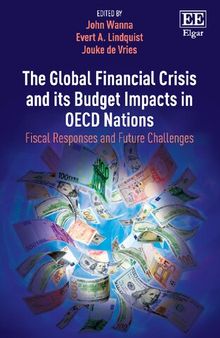 جزییات کتاب
جزییات کتاب
This is a timely, important book for fiscal policy-makers and budget practitioners. It assesses why some advanced democracies were prepared for the global financial crisis and others were not, and how some countries responded in ways that exacerbated fiscal instability. Its dozen country cases offer highly relevant lessons for mitigating cyclical disturbances that frequently beset national budgets and for managing public finances during turbulent times. The key takeaway message is that government capacity and budget policies matter and should dispel the notion that all countries are helpless when crisis strikes.'- Allen Schick, University of Maryland, USThe global financial crisis of 2007-09 constituted the biggest shock to the economies of the OECD nations since the Second World War, testing budgetary systems and causing most of their governments to move into intense crisis mode. Policy responses by governments and international authorities included massive interventions to stabilize markets and economies, and significant adjustments to fiscal policy regimes. How governments reacted to the crisis, which was manifested differently in each jurisdiction, had significant political implications for sitting governments and led to reforms of fiscal policy and budgetary regimes, which have since continued to wrestle with slow economic growth and strained public finances.This singular shock provides the editors and authors of this book with an intriguing opportunity to examine how different OECD budgetary systems performed. The contributions frame and assess how governments responded to the challenge and how their budget systems evolved in the aftermath, with a focus on strategy, decision-making and balancing competing demands. Chapters cover the EU, North America and Asia, including comparison between countries that fared well, those who were moderately affected and those countries massively affected by the global financial crisis.This timely book will appeal to students and academics seeking an international understanding and analysis of the effects and consequences of the global financial crisis.Contributors: M.G. Arghyrou, R. Boyle, S. Davidsen, T. Degen, D.M. Fantone, D.A. Good, M. Horie, L. Jensen, E. A. Lindquist, M. Mulreany, P.T. Pereira, P.L. Posner, J. de Vries, J. Wanna, L. Wemans, E. Zapico-Goñi



 دانلود کتاب
دانلود کتاب

 جزییات کتاب
جزییات کتاب





 این کتاب رو مطالعه کردید؟ نظر شما چیست؟
این کتاب رو مطالعه کردید؟ نظر شما چیست؟
